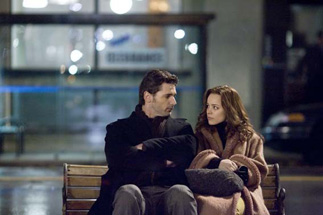|
|
Book vs. Movie: The Time Traveler's WifeBy Russ BickerstaffAugust 18, 2009
Suffice it to say, it's a pretty sad story. There's a great deal of romance here, though. The problem is that none of the prose feels particularly fresh. Niffenegger has said that she writes with "a little movie" that runs in her head as the story flutters into prose. That sort of storytelling style really shows through in the book, which is extremely heavy on dialogue, making the 500+ pages of the book a surprisingly quick read. It's a real roller coaster of a novel, but it lacks significant depth beyond the romance. Yes, there are issues being addressed here, but there's little insight into the mysteries the novel explores beyond the inherent cleverness of the premise. As intense as it is, too much of what's going on here feels like empty emotion. The Movie Screenwriter Bruce Joel Rubin (Ghost, The Last Mimzy) has taken a very careful approach to the adaptation, which amplifies the emotional intensity of the novel without leaving too much out. Niffenegger's approach to telling the story is very scattered and episodic. The story in the novel comes out in isolated scenes. Any first time novelist will have trillions of ideas streaming into the narrative and the plot of this novel gives that kind of energy room to breathe, but it lacks finesse. Rubin takes individual scenes that are quickly glossed-over in the novel and gives them extended moments that stir emotions much more effectively than Niffenegger's prose. This would not be the case were it not for the camera work of an exceedingly competent director (Robert Schwentke) and, most likely, a really talented DP (Florian Ballhaus.) The scene between an adult Henry and the mother he never knew in adulthood (Michelle Nolden) is a brilliantly crafted bit of screen drama. From beginning to end, the director makes brilliant use of on-location shooting on a very distinct and authentic Chicago elevated train.
[ View other columns by Russ Bickerstaff ]
[ View other Book vs. Movie columns ]
[ Email this column ]
|

|
|
|

|
Friday, April 26, 2024
© 2024 Box Office Prophets, a division of One Of Us, Inc.


